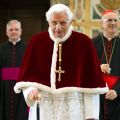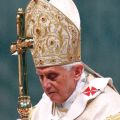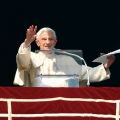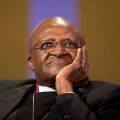Fr. Raymond J. de Souza is the pastor of Sacred Heart of Mary parish on Wolfe Island, and chaplain at Newman House at Kingston, Ont.'s Queen's University.
VATICAN CITY - Perhaps St. Francis — who wrote poetically of Brother Sun praising God — provided the weather for Pope Francis on the day of his inaugural Mass. After two weeks in Rome where the weather was wet, overcast and dreary, the sun shone brightly on St. Peter’s Square as the Holy Father began his Petrine ministry on March 19, the Feast of St. Joseph, patron and protector of the universal Church.
Benedict brought back biblical theology
By Fr. Raymond J. de SouzaBefore we receive a new pope, it is worthwhile to consider the impact of the pontificate itself.
Papal office is forever changed
By Fr. Raymond J. de SouzaLast week, we looked here at the complete novelty of Pope Benedict’s abdication, clarifying that such a thing has never been done in the entire history of the Church.
Unprecedented, yes, but not against established practice
By Fr. Raymond J. de SouzaPope Benedict XVI’s renunciation of the See of Peter has occasioned much commentary about how rare a papal resignation is. Many have said that it has been 600 years or 700 years, depending on how one counts. It is more radical than that. What the Holy Father did has never been done in the history of the Church. Ever.
Pope made a courageous call
By Fr. Raymond J. de SouzaPrudence and wisdom from a disciplined, virtuous man
JERUSALEM - Perhaps the greatest mind to sit on the throne of Peter has judged that his body is no longer capable of doing so. Pope Benedict XVI will resign as successor of Peter on Feb. 28.
Art and the beauty of faith
By Fr. Raymond J. de SouzaOne of my favourite insights from Joseph Ratzinger’s long life in theology is that the Church does not convincingly propose the faith by the work of theology alone. Before his election as Pope he wrote that in the end the Church only has two compelling “arguments” for her faith being true. The first is the saints who have lived the Gospel fully and who the Church proposes as models of Christian witness. The second is the art that she has nurtured in her midst, her faith expressed in beauty, whether in painting, sculpture, architecture or music. Theology is necessary, but it is holiness and beauty that persuades.
Musial, Mantle and manly virtue
By Fr. Raymond J. de SouzaBaseball’s spring training is not far off, and our Catholic “spring training” — the discipline of Lent — is fast approaching too. Not a bad time to think about baseball and virtue, which was brought to mind by the recent death of Stan Musial, one of the greatest ballplayers of all time.
Musial dominated the 1940s and 1950s, winning seven batting titles, three National League MVPs and winning the World Series three times. Even today, 50 years after his retirement in 1963, he remains second all-time for total bases, behind only the incomparable Hank Aaron, and fourth in all-time hits, behind Pete Rose, Ty Cobb and Aaron. He died at age 92, predeceased last year by his wife of 72 faithful and faith-filled years. His funeral was in St. Louis, at which a young boy who wanted to be like Stan Musial when he was growing up in that proud baseball city, Timothy Dolan, now cardinal archbishop of New York, was present to honour a Catholic disciple who tried to go to Mass every day.
In a eulogy given by another proud St. Louis baseball man, a moving story was told about Musial’s quiet holiness. Bob Costas, perhaps the most gifted broadcaster in sports, recalled an occasion in which Mickey Mantle, the great Yankee of the 1950s and 1960s, was visiting in his retirement. Costas invited Stan Musial to dinner and told Mantle who was coming. Mantle, a long-time alcoholic, told Costas: “I don’t know how I am going to do it, but I am not going to have a drink all day tomorrow or all evening. I don’t want to do anything foolish in front of Stan Musial.”
Tens of thousands wanted to be like Stan Musial the ballplayer. Mantle, who was almost as good as Musial on the diamond, knew that he ought to be like Musial the man.
“Stan was a better player than me, because he was a better man,” Mantle told Costas.
There are few decisions men, especially young men, make that are as important as choosing their friends. Perhaps the greatest compliment a man can receive is that which Mantle gave Musial — I don’t want to do anything foolish, anything unworthy, anything sinful in front of him.
Mantle spent most of his life choosing his friends unwisely. Perhaps because of all the scandals, movies were made of his life. Musial’s life was too simple, too honourable, too pious for Hollywood. One of the best of the Mantle films, perhaps the greatest of all baseball films, is 61*, a Billy Crystal film about the 1961 home run chase between Mantle and Roger Maris.
“Maris, the North Dakota homebody who has just won the 1960 Most Valuable Player award, sees that Mantle, the Oklahoma hellion who might have been the greatest player ever had he not blown out his knee in the 1951 Series, is risking both his own and the team’s success by his compulsive boozing and wenching,” wrote George Weigel, papal biographer and accomplished baseball fan, about a key scene in 61*.
“So Maris and his apartment-mate, outfielder Bob Cerv, invite Mantle to move in with them, cut out the nocturnal craziness, and get himself back together,” Weigel continues. “That act of solidarity, matched by the way manager Houk and Maris’s teammates rally around him when both fans and sportswriters choose Mickey over Roger in the Great Bambino Record Chase, exemplifies the distinctive way men can be friends. Mickey Mantle, a tortured spirit, died in 1995 after telling a press conference, ‘Don’t be like me. God gave me the ability to play baseball and that’s what I wanted to do. God gave me everything and I just wasted it.’ ”
Weigel concludes with the contrast: “Maris died in 1985 of Hodgkin’s lymphoma and is buried in his hometown, Fargo. This unassuming family man, who never took advantage of the lifestyle libertinism that Gotham (and the journalistic conventions of the era) made possible, was a good husband and father who endured hate mail and death threats, fan idiocies and press barbs. Roger Maris, a Catholic whom some would argue is the real single-season home run king, is one of the quiet heroes of the American Catholic experience.”
Little boys like Tim Dolan in St. Louis look for heroes at the ballpark. Grown-ups realize that the men on field are often not heroes at all. But sometimes they are, and sometimes even a grown-up cardinal of the Holy Roman Church finds a hero there. Stan Musial was a quiet Catholic hero. As Mickey Mantle might have said: “Be like him.”
(Fr. de Souza is the editor-in-chief of Convivium, a Canadian magazine of faith in our common life: www.cardus.ca/convivium.)
25 and 40 years of shame
By Fr. Raymond J. de SouzaCanada, U.S. have world’s most extreme abortion licence
Desmond Tutu and hell
By Fr. Raymond J. de SouzaVictor Chan is the Dalai Lama’s man in Vancouver, arranging the Buddhist monk’s visits to that city. In a new book, The Wisdom of Compassion, Chan documents those visits, especially an encounter between the Dalai Lama and South Africa’s Anglican Archbishop Desmond Tutu in Vancouver in 2004.
I haven’t read the book, but the reporting of that meeting gives us an illuminating example of how the mainstream media covers religion. The headlines on stories about the book contained this eye-catcher: “God is not a Christian, says Tutu.” An excerpt appeared online at The Huffington Post and created quite a buzz.
Desmond Tutu, a man of admirable courage, was indispensable to the dismantling of apartheid in South Africa and the subsequent truth and reconciliation commission. Yet as a theological thinker, Archbishop Tutu is rather unimaginative and predictable. On any controverted question, he reliably takes the position adopted by the fashionable view of the secular liberal consensus. So when he declared in 2004 to the Dalai Lama that “God is not a Christian” it was perhaps newsworthy given that he is a Christian clergyman, but it was not new. In fact, it is not even that remarkable, for God is not a disciple of Jesus Christ, which is what a Christian is. If Archbishop Tutu was to say that Jesus Christ is not God, or that He did not reveal who God is to us, that would be something different, for it would mean that Archbishop Tutu is not a Christian.
The archbishop did say something remarkable in that encounter, but it was not what was highlighted in media reports.
“The glory about God is that God is a mystery,” Tutu said. “God is actually quite incredible in many ways. But God allows us to misunderstand her but also to understand her.”
This too was given wide play, noting that the reference to God as “she” produced wild applause in the audience.
“I’ve frequently said I’m glad I’m not God,” Tutu continued. “But I’m also glad God is God. He can watch us speak, spread hatred, in His name. Apartheid was for a long time justified by the church. We do the same when we say all those awful things we say about gays and lesbians. We speak on behalf of a God of love. The God that I worship is an omnipotent God. He is also incredibly, totally impotent. The God that I worship is almighty, and also incredibly weak.
“He can sit there and watch me make a wrong choice,” Tutu continued. “But the glory of God is actually mind-blowing. He can sit and not intervene because He has such an incredible, incredible reverence for my autonomy. He is prepared to let me go to hell. Freely. Rather than compel me to go to heaven. He weeps when He sees us do the things that we do to one another. But He does not send lightning bolts to destroy the ungodly. And that is fantastic. God says, ‘I can’t force you. I beg you, please for your own sake, make the right choice. I beg you.’ ”
When Tutu speaks about God not being Christian, or God being “she” or about how Christians are beastly to gays and lesbians, it is trumpeted as extraordinary and courageous, even though it is neither, as witness the laudations in the hall.
What is remarkable though is that Tutu speaks about God’s respect for our freedom to the point of making Himself weak. Some may think it bold to say that God is “impotent.” From St. Paul onwards the Church has preached Christ crucified. That God makes Himself “impotent” before our freedom was commonplace in the preaching of the Fathers of the Church.
The news in the excerpt is that the impeccably liberal Desmond Tutu believes in hell. Hell means that God respects our freedom to the extent of honouring the consequences of our choices; a cosmos without hell is also without freedom. It is likely that Tutu’s comments about hell were not met with rapturous applause, which is a good sign, because the preacher who always gets rapturous applause is not a preacher at all, but a panderer.
The mainstream media prides itself on being bold in challenging orthodoxies, both sacred and profane.
The Huffington Post thought it was doing just that in highlighting the apparent Christian heterodoxy of a great liberal hero, Archbishop Tutu. But he was just echoing the secular liberal orthodoxy. The actual news was that, whatever his views on gender and sexual orientation, Tutu was perfectly orthodox on the reality, and necessity, of hell in his conversation with the Dalai Lama.
The headline should have been: “Tutu reminds the Dalai Lama about hell.”
(Fr. de Souza is the editor-in-chief of Convivium, a Canadian magazine of faith in our common life: www.cardus.ca/convivium.)
Glimpsing holiness through the joy of sport
By Fr. Raymond J. de SouzaAVE MARIA, FLORIDA - Notre Dame football brings together religion and sports in a particularly pleasing way, and for this football chaplain to be on hand in Miami for the college football national championship — Notre Dame vs. Alabama — was a blessing most pleasing indeed. It was a more conflicted blessing after the opening kickoff, from which point Alabama administered a severe beating to Notre Dame en route to its third national championship in four years.








